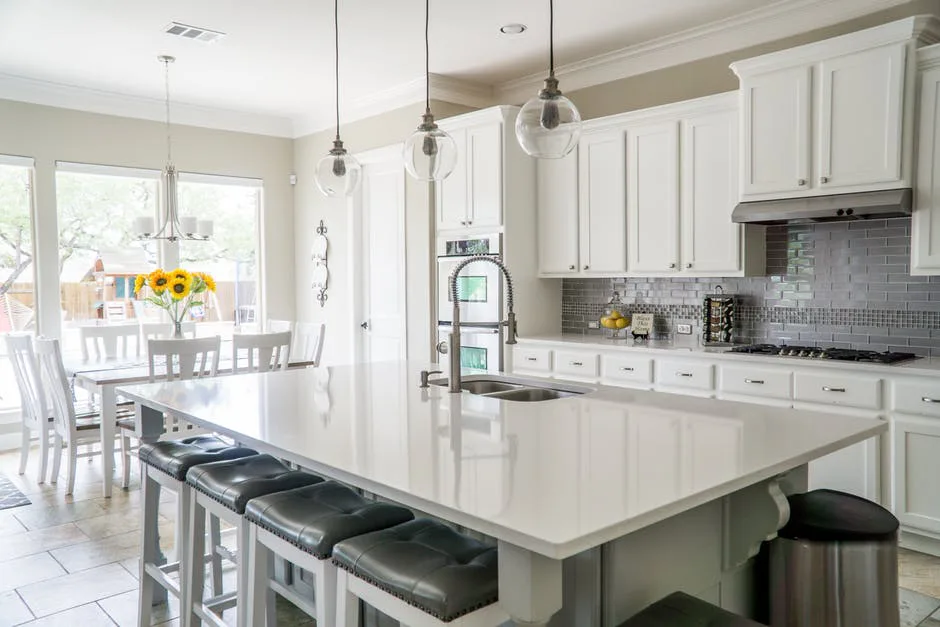The average homeowner spends just shy of $3000 on countertop installation.
New countertops are a significant investment, which is why you want to take your time when choosing the materials, colors, patterns, and contractors.
For many people, the biggest decision when it comes to choosing countertops is the material. Without a doubt, quartz is one of the most popular countertop materials.
But, is this material right for your kitchen? Does it live up to the hype?
Check out this guide to learn about the top pros and cons of quartz countertops.
What is Quartz?
Before we dive into the pros and cons, let’s take a close look at what exactly quartz is. Many people think that quartz is a humanmade material. However, quartz is a natural mineral that’s composed of silicon and oxygen. And, it’s the most abundant mineral on earth.
The confusion usually comes from the fact that even though quartz is natural, quartz countertops are humanmade. To make a quartz countertop, one must grind quartz into dust and then combine it with other natural and synthetic materials.
Synthetic materials that quartz is usually combined with include pigments, polymers, and resins. The polymers and resins work to bind the quartz together to make it durable and hard. The dyes work to give the quartz countertop its color.
Typically, natural quartz makes up 90 percent of the entire countertop, while the other ten percent is made out of synthetic materials.
Pros of Quartz Countertops
Let’s start by looking at why people love quartz countertops:
Variety
Quartz countertops come in a wide range of colors and patterns. If you wish, you can even get your quartz countertop in a design that very closely mimics natural stone.
Or, if you’re looking for an extremely contemporary look, you can purchase a quartz countertop made from recycled materials or one that has metallic flecks.
Appearance
If you’re looking for a countertop material that’s sleek, elegant, and modern, then quartz is your answer.
Because manufacturers of quartz countertops can mimic pretty much any design, they can make your quartz countertop look as classy as a real marble countertop.
Durability
One of the main reasons to invest in a quartz countertop is because of its strength.
If you’re looking for a material that doesn’t chip, scratch, or crack, then quartz is your answer.
In fact, on the Mohs scale of hardness, which is a scale that geologists use to measure the scratch resistance and hardness of a mineral, quartz ranks as a 7 on a scale from 1 to 10.
In contrast, marble falls between a rating of 3 and 5.
Warranty
Manufacturers are so confident in quartz’s durability, that many of them offer a very generous warranty.
Most companies offer a warranty between 10 and 25 years.
Non-Porous
If the material is porous, it means that liquids can seep beneath its surface. This can lead to discoloration, staining, and irreversible damage.
Even worse, bacteria and germs can make their way into the pores, making the countertops hard to clean and disinfect.
Because of this, if you invest in a porous surface, you’ll need to seal it to prevent staining.
Luckily, because quartz is a non-porous material, you never have to worry about sealing it. This also means that quartz is incredibly stain-resistant.
Low Maintenance
One of the other main benefits of quartz is that it’s incredibly low maintenance.
Because it’s non-porous, cleaning quartz is a breeze. For the most part, all you need to do is wipe down your countertops with soap and water, and you’ll be good to go.
Cons of Quartz
As you can see, there are a lot of benefits to quartz countertops. But, there are also some drawbacks, such as:
Price
If you’re on a tight budget, then quartz might not be the best choice for you.
All the beautiful benefits of quartz- non-porousness, durability, ability to customize- come with a cost.
Typically, you can expect to pay between $65 to $100 per square foot for your quartz countertop.
Susceptible to Heat Damage
While quartz is incredibly durable, it is vulnerable to heat damage. While quartz is heat resistant, the polymers and resins it’s made out of, are not.
Therefore, if you expose your quartz countertop to hot cookware, there’s a chance that the resins could melt, causing permanent damage and discoloration.
So, if heat is a significant concern for you, you may want to reconsider purchasing a quartz countertop.
Difficult Installation
If you want to install quartz countertops, it’s essential to know that this is not an afternoon DIY project.
Quartz should always be installed by a trained professional. This is in part due to its extreme heaviness, as quartz weighs about 20 to 25 pounds per square foot.
Installers also need to be very careful about minimizing the appearance of seams when installing quartz countertops.
In other words, if you’re looking for a countertop material that you can install yourself, this isn’t it.
Can’t Use Outdoors
If you’re looking to build an outdoor kitchen, quartz is not the right countertop material for you.
Quartz can discolor when exposed to direct sunlight for extended hours.
Pros and Cons of Quartz Countertops: Is it Right for You?
Now that you know about the top pros and cons of quartz countertops, it’s time to decide if this material is right for you.
If you decide that quartz is the right material for you, then you need to make sure you choose the correct installer. The right installer can make all the difference in the final appearance of your quartz countertops.
But, if you don’t think quartz is the right material for you, we suggest looking at other materials such as graphite, marble, or quartzite.
And, if you’re looking to get new countertops installed soon, contact us today.

